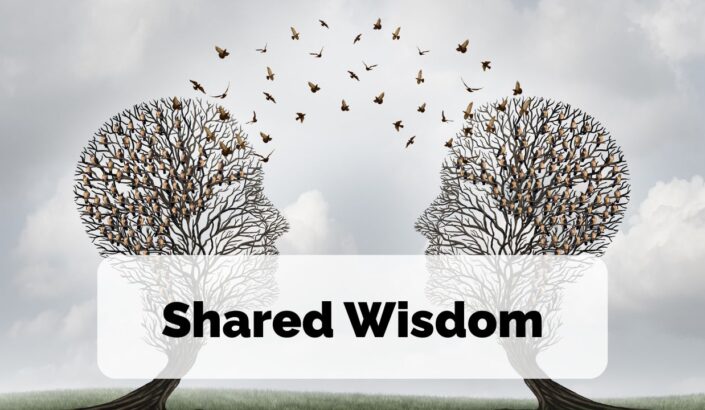Everyone is doing their best, even when it seems like they are doing their worst.
Everyone is dreaming or having a nightmare, battling with pain you may never understand.
You don’t have to condone their actions.
You may not be able to wake them up.
You don’t have to like what happened.
Simply let go of the illusion
that it could have been any different.
We shared these words from Jeff Foster’s poem called “A Forgiving Moment” in a recent Greater Good Educators Community of Practice. Researchers have defined forgiveness as a process, beginning with the choice to let go of resentment, negative judgment, and negative behavior towards the person who has harmed you.
For me, “Letting go” is so much easier said than done. Thankfully, Foster’s poem also acknowledges the struggle to forgive: Accept your non-acceptance in the present./Forgive your inability to forgive. “Thank you, Jeff Foster,” I say with an outbreath of relief. (And so did many other Community of Practice participants after reflecting on this poem.)
Forgiveness is complicated and messy–and it doesn’t happen overnight, but it’s foundational to nurturing positive relationships at work and a healthy school culture. With this in mind, we’ve been asking education professionals across the globe how they view forgiveness—and how they approach it in their classrooms and schools. Ninety-six percent of the educators we surveyed claimed that forgiveness is an important concept to model and teach. Yet, many also confess that forgiving is a profoundly challenging and humbling undertaking.
Participants in our focus groups, community meetings, and Greater Good Educators Community of Practice Program are grappling with what it looks like and feels like to forgive themselves, other adults, and the larger systems and institutions that perpetuate harm—with 92% admitting that it is actually harder to practice forgiveness with colleagues (more than students).
At the same time, our forgiveness focus group members associated the following positive words with forgiveness: letting go, peace, heart-centered, starting over, unconditional surrender, healing, vulnerability, gratitude, understanding, honesty, acceptance, moving on, kindness, a gift.
We invite you to draw on this sampling of educational professionals’ thoughts and questions about forgiveness. Consider them as prompts and/or entry points for discussion in your own grade-level meetings or staff meetings at your school.
Forgiveness is … ?
- A journey or a process–it is not an isolated action.
- A practice.
- Giving yourself permission to move forward–not excusing the hurt or harm.
Describe the experience of forgiveness.
- It is affected by many variables, including grief.
- The process is long and messy.
- We revisit fragments from the past, present, and future.
- Anger and grief are part of the process, and you can achieve peace, forgiveness, and hope only by feeling the [unpleasant] feelings, examining them in a safe environment, allowing them to speak to you.
What is the role of “inherent worth” in forgiveness?
- The starting point is acknowledging everyone’s inherent worth or value.
- Forgiveness’s sister practice is compassion.
- Restorative practice doesn’t have to mean forgiveness; it’s about healing—being seen, resourced, and connected.
- We need each other; no one is disposable.
How do we approach forgiveness with a systemic and/or cultural lens?
- The lack of forgiveness across generations is a cultural pattern.
- Students observe daily how there is no reward for forgiving or asking for forgiveness (e.g., [as modeled by] teachers, parents, politicians, celebrities)
- Small acts of forgiveness may accumulate into larger societal change.
- What does forgiveness look like within systems that continue to perpetuate harm?
What might forgiveness in education look like? How do we change current mindsets around forgiveness?
- We force our students to forgive someone when maybe they aren’t ready to forgive.
- If we ask our students to be empathic, humble, and to have mercy on others, we have to practice the same.
- Do we teach kids to comply instead of taking ownership?
- What is the difference between a sincere apology and a false apology?
- How can we support adults resistant to the concept of forgiveness?
- We teach about empathy, but do we spend time teaching students tools for forgiveness?
Where can we model + teach forgiveness?
- Circle time
- Advisory
- Restorative practices
- Health class (“It links well with setting personal boundaries and healthy, clear communication.”)
- One-on-one conversations
- Teachable moments (real time)
- SEL Lessons/Curricula (“It goes along with growth mindset and emotion regulation.”)
- Embedded everyday
- Needs to be embraced by the whole school
Take It Deeper
-
Reflect on the following questions:
- How do you and your colleagues approach and practice forgiveness at work?
- How much or how often do you lean into self-forgiveness (and self-compassion) in your work?
- What are the best ways to model, encourage, and/or explicitly teach your students about forgiveness right now?
- Feel free to peruse some of our Greater Good forgiveness articles.
- Explore these research-informed Greater Good in Education practices for both adults and students.

Are you ready to build a kinder, happier school where everyone belongs? Join Greater Good Educators! Explore the science of well-being in a supportive community of educators from around the world. Registration is now open for the 2025-2026 school year!


